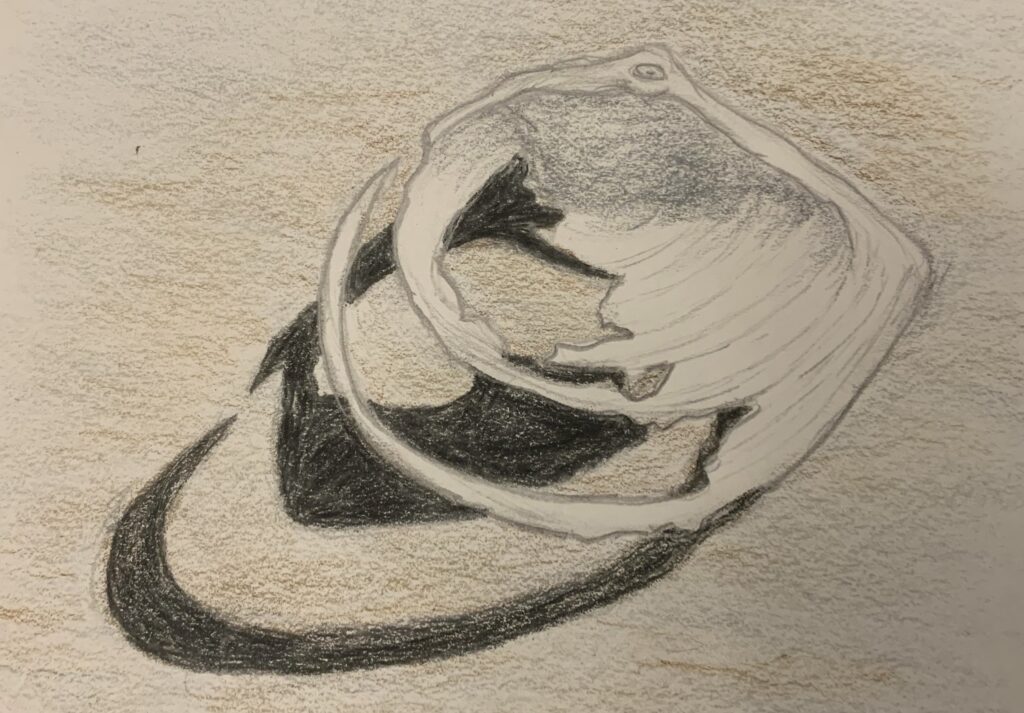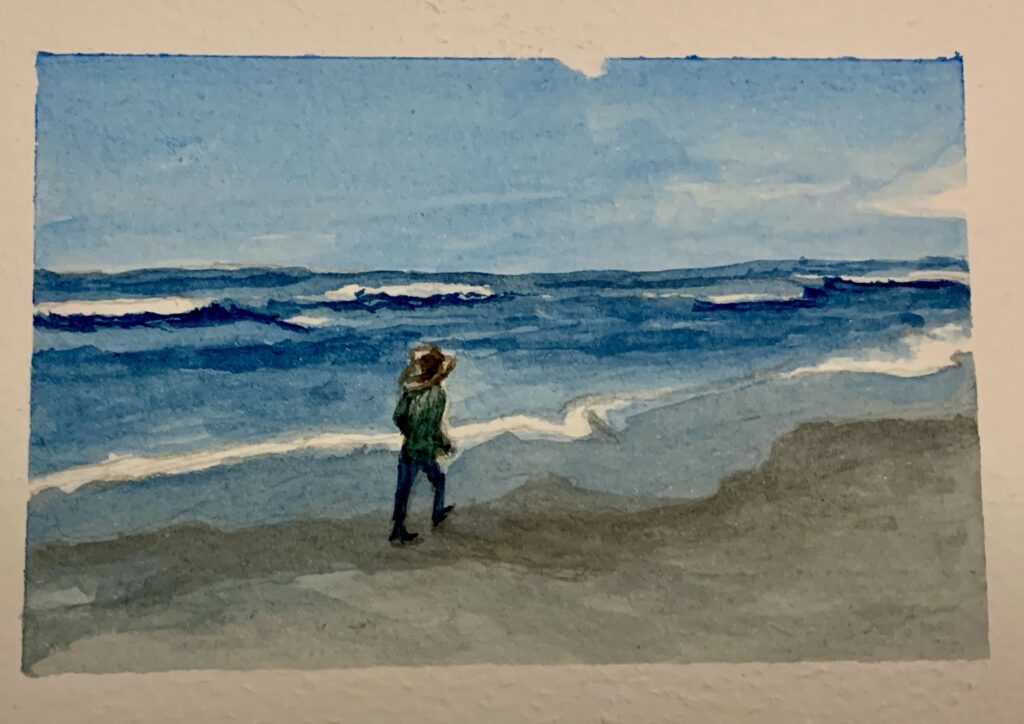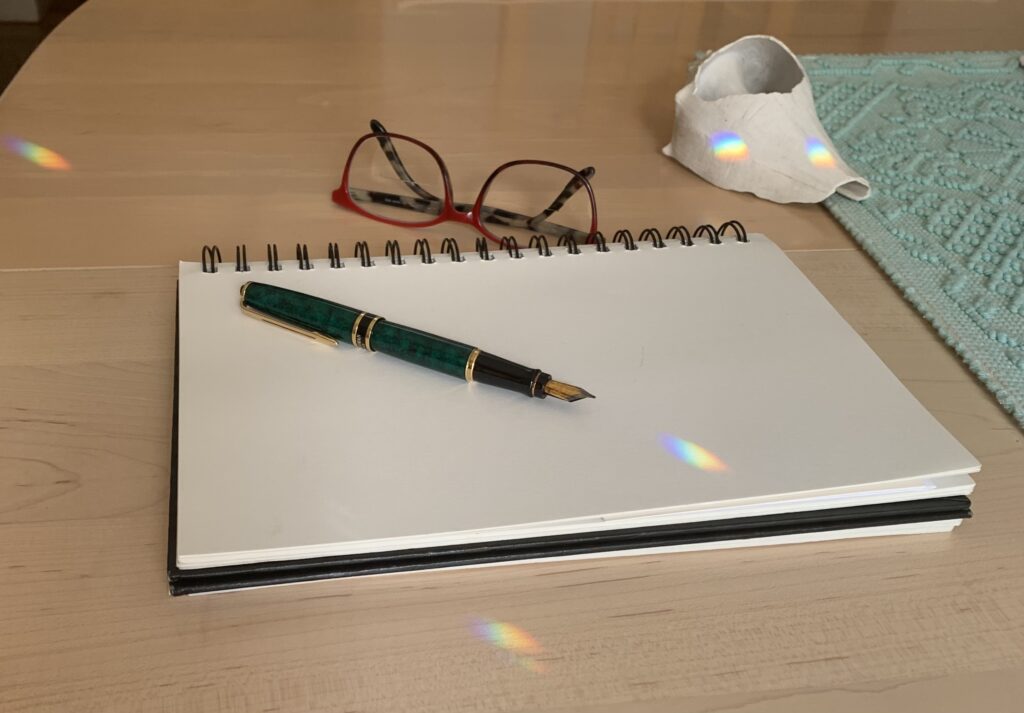One sunny fall morning, a friend and I shared coffee and conversation in an old city park. It’s become a favorite rendezvous. Covid-conscious, neither of us is keen on eating inside. Besides, the park was aflame with color: Maples showing orange and red. Ginkos glowing yellow in the sunlight. Majestic ash and elms flaunting their grand canopies for all to see.
In such a beautiful setting, one might expect lofty thoughts and happy moods. But I was having none of that. I wasn’t dismal, just disconnected. I was tempted to blame my floundering on a three-week vacation, but really, I was adrift before that. If anything, vacation helped me relax and connect with my center, opening me to meet to each day without an agenda, welcoming whatever came: Visits with two of my daughters out east, great food, and long conversations, country walks sandwiched between hurricane Ian’s lingering rains, wanders along the beach, and a little drawing and painting.


Back home, re-entry was difficult. I’ve lived alone for eleven years, but after three weeks in the delightful company of others, I felt lonely. I watched too much TV and ate way too much, wiping out months’ of hard-won weight loss. Settling back into writing routines just didn’t happen. Not much luck with prayer practices or journaling either.
All in all, I felt a mess.
My friend is a good listener. After the rambling “confession” of my failures, we grew quiet and sipped coffee. The air was chill, and I cradled the mug in my hands, grateful that he had brewed coffee and carried it in proper mugs from his home across the street. Hot drinks in styrofoam are way less comforting.
“We’re all in a mess, one way or another,” he volunteered.
“True.”
I thought of Sharon Salzberg, a renowned Buddhist meditation teacher in the West. One of her “On Being Project” interviews with Krista Tippett was titled, “The Healing Is In The Return.” She talked about starting meditation and her mistaken ideas of what it was and how it worked. She thought that each day she would be able to sit longer with a quiet mind. It would accumulate until she reached her goal of long, still, meditative sits. She discovered that wasn’t the point at all:
“… learning how to let go more gracefully was the point. Learning how to start over with some compassion for yourself instead of judging yourself so harshly—that was the point. … It’s still the most significant thing I’ve ever learned from meditation and that I use it every single day, because we do. We must start over and do a course correction, or pick ourselves up if we’ve fallen down, every day.”
In thirty-plus years of meeting with my spiritual director, I have heard her recommend self-compassion more times than I can count. Why is it difficult to practice?
Instead, it’s easier to listen to my inner critic picking on all the things I haven’t done or have done poorly, the stuff I did that I didn’t want to do, like buying chocolate and eating it all at once instead of a piece a day as I told myself I would.
“Good thing God’s in the mess,” I offered.
Isn’t that point of incarnation? The Holy One being with us wherever we are? However we are? Jesus liked to be in the mess, and he liked the people who were in them. He hung out with the marginalized, exasperated the righteous religious leaders by ignoring their pious rules, and got into trouble speaking the truth.
I love Eugene Peterson’s translation in The Message of Jesus quoting Isaiah in Matthew, “I prefer a flexible heart to an inflexible ritual.”
Jesus got it. Being a human being isn’t easy. Growing into one’s true self isn’t a linear journey. Lots of stops and starts, fear and love, failures and successes circle around over and over. As Mother Teresa said, “We are not called to be successful, but faithful.”
Salzberg learned that as she embraced meditation. The point is getting up again. Forgiving yourself and showing yourself the same compassion that you show to others.
That’s what I’m learning too. Again. When I blow my efforts to eat better, eat less, and lose weight. When I stay up way too late, even though I’m a natural night-owl. When I binge TV instead of reading the books I want to read. When I don’t journal or draw or paint or engage in prayer practices that bear fruit. Basically, when I’m in a mess and am discouraged—and how often it that?—I need to have faith in God-with-me and start fresh. Like the next blank page in my journal.

This is part of perennial wisdom tradition, a great river that feeds all wisdom traditions from ancient times. Jewish, Christian, Buddhist. All of them, religious or not. It shows up in holy books, literature, embroidery on pillows, and prints on magnets. Here are a few examples:
In Pirke Avot: The Sayings of the Fathers, a collection of ancient Rabbinic texts, there is a short saying that points to the importance of not giving up: “You are not required to finish your work, yet neither are you permitted to desist from it.”
Buddhist author and teacher, Pema Chodron has a book titled Start Where You Are. Author Lucy Maud Montgomery, in Anne of Green Gables, writes, “Tomorrow is always fresh with no mistakes in it.” It’s possible to let go one day’s disappointments and have enthusiasm for the day to come.
I find strength and hope in knowing that I don’t tackle tomorrow on my own but can draw on the transforming Love and Presence within. Of all the words on this topic, I gravitate to these, most often attributed to Saint Benedict:
Always, we begin again.
